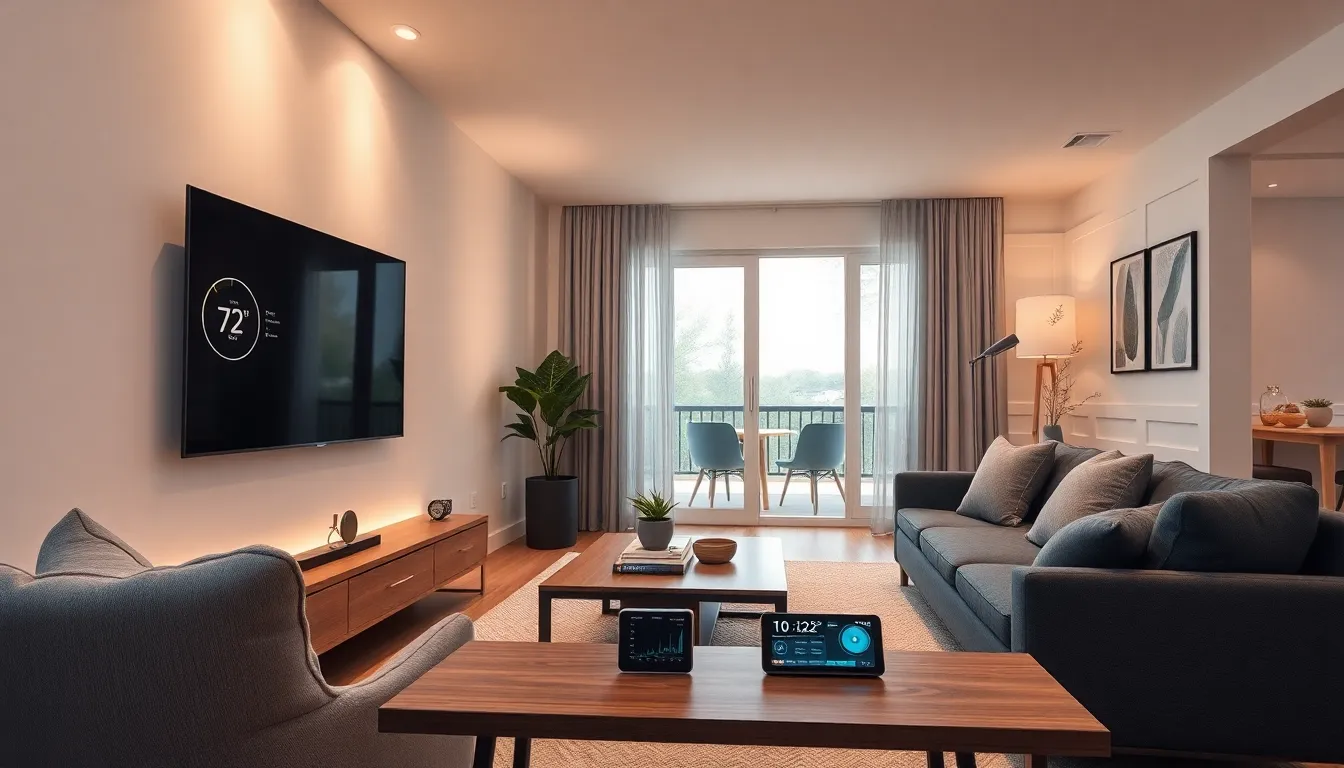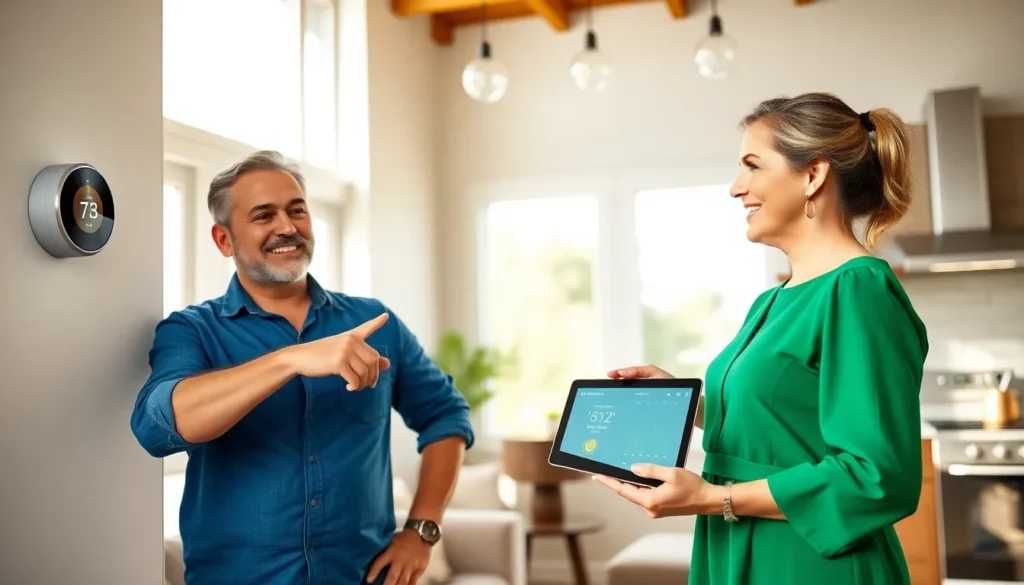Table of Contents
ToggleIn a world where energy bills seem to have a mind of their own, smart home technology is the superhero we didn’t know we needed. Imagine a home that not only knows when you’re coming and going but also keeps your energy costs in check. It’s like having a personal assistant who’s really passionate about saving you money—without the awkward small talk.
Benefits Of Smart Home Energy Tips
Smart home energy tips provide significant advantages in managing both costs and environmental impact. These benefits contribute to a more efficient and sustainable living environment.
Cost Savings
Smart home systems promote energy efficiency by automatically adjusting settings based on usage patterns. Individuals save on monthly energy bills as smart thermostats and lighting systems optimize consumption. Remote monitoring allows homeowners to control appliances even when away. Programs encouraging off-peak usage further reduce costs. Real-time energy tracking provides insights into how much energy devices use. Over time, these savings accumulate, making smart home technology financially beneficial.
Environmental Impact
Reducing energy consumption directly benefits the environment. Smart home systems minimize waste by ensuring appliances only operate when necessary. Lower energy use leads to decreased fossil fuel emissions, contributing to cleaner air. Moreover, many smart devices support renewable energy sources, encouraging a shift towards greener alternatives. Enhanced efficiency in homes fosters a sustainable lifestyle, aligning daily habits with environmental conservation. Consequently, these technologies not only help household budgets but also promote a healthier planet.
Essential Smart Home Devices

Smart home devices significantly enhance energy management and efficiency. They assist users in reducing costs while promoting environmental sustainability.
Smart Thermostats
Smart thermostats adjust heating and cooling based on real-time data. They learn from user habits, preferring energy-saving settings when the home is empty. With mobile apps, users control temperatures remotely, ensuring comfort and efficiency. The Energy Star-certified models often save households around 10 to 20 percent on annual heating and cooling bills. Integration with other smart home systems creates a comprehensive energy management approach, optimizing performance.
Energy Monitoring Systems
Energy monitoring systems track real-time energy consumption across devices. These systems offer insights into energy usage patterns, identifying inefficient appliances. Users receive alerts when consumption exceeds set limits, enabling proactive adjustments. Reports generated by these devices highlight periods of high usage, fostering informed decisions about energy use. Analysts estimate that households can save 5 to 15 percent on energy costs through these systems. Enhanced awareness leads to more sustainable habits, ultimately benefiting both finances and the environment.
Tips For Maximizing Energy Efficiency
Maximizing energy efficiency through smart home technology can lead to substantial savings. Smart devices adapt to lifestyles, creating an environment that prioritizes efficiency.
Smart Lighting Solutions
Smart lighting reduces energy consumption significantly. LED bulbs use up to 75 percent less energy than traditional incandescent bulbs. Smart lighting systems allow users to control their lights remotely, ensuring that lights aren’t left on in unoccupied rooms. Scheduling options enable automatic adjustments based on daily routines, conserving energy without effort. Utilizing motion sensors reduces waste by turning lights off automatically when no one is present. This combination leads to increased energy savings and lower electricity bills.
Automation And Scheduling
Automation enhances energy efficiency by eliminating unnecessary energy use. Smart thermostats can adjust temperatures based on occupancy and set schedules tailored to users’ lifestyles. These devices can save 10 to 20 percent on heating and cooling costs annually, simply by optimizing settings. Scheduling gets more precise; users can program their systems to operate during off-peak hours, taking advantage of lower energy rates. Integrating appliances into an automated setup further maximizes efficiency, ensuring optimal performance at all times.
Common Mistakes To Avoid
Smart home energy management brings numerous benefits, but certain mistakes can hinder efficiency and savings.
Overlooking Device Compatibility
Choosing smart devices requires attention to compatibility. Some devices may not work well with existing systems, leading to challenges in integration. Prioritizing compatible brands and products avoids functionality issues. Researching device specifications before purchasing can ensure seamless communication between smart technologies. Furthermore, neglecting updates can create security vulnerabilities and compatibility problems. Always explore user reviews for insights on experiences with specific devices. Keeping a careful eye on standards like Zigbee, Z-Wave, and Wi-Fi helps maintain a cohesive smart home ecosystem.
Ignoring Usage Data
Ignoring usage data negates potential savings. Smart devices collect valuable insights about energy consumption patterns. Failing to analyze this information prevents users from making informed adjustments. Identify peak usage times and reduce energy consumption during those periods. Utilizing energy monitoring systems allows households to see which appliances consume excessive energy. Efficient energy utilization stems from understanding trends and taking action based on data. Emphasizing the importance of regular check-ins on usage data empowers users to optimize settings and save on monthly bills.
Embracing smart home technology is a game changer for energy management. By leveraging the capabilities of smart devices, households can significantly cut down energy costs while contributing to environmental sustainability. The combination of real-time monitoring and automation allows users to make informed decisions that align with their lifestyles.
Maximizing energy efficiency isn’t just about saving money; it’s about creating a sustainable future. With the right tools and strategies in place, users can enjoy a more eco-friendly home that prioritizes both comfort and cost savings. Adopting these smart energy tips will lead to a more efficient household and a healthier planet for generations to come.







